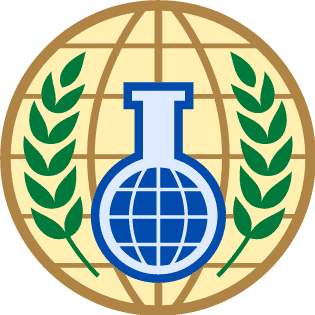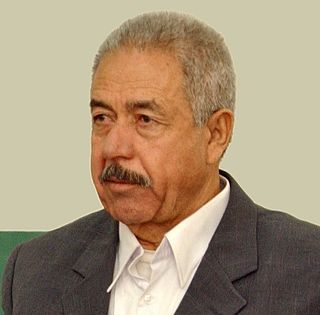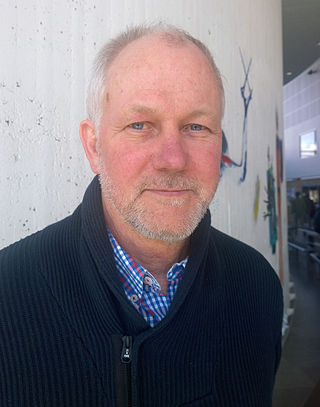Related Research Articles

The Organisation for the Prohibition of Chemical Weapons (OPCW) is an intergovernmental organisation and the implementing body for the Chemical Weapons Convention (CWC), which entered into force on 29 April 1997. The OPCW, with its 193 member states, has its seat in The Hague, Netherlands; it oversees the global endeavour for the permanent and verifiable elimination of chemical weapons.

The Chemical Weapons Convention (CWC), officially the Convention on the Prohibition of the Development, Production, Stockpiling and Use of Chemical Weapons and on their Destruction, is an arms control treaty administered by the Organisation for the Prohibition of Chemical Weapons (OPCW), an intergovernmental organization based in The Hague, The Netherlands. The treaty entered into force on 29 April 1997. It prohibits the use of chemical weapons, and the large-scale development, production, stockpiling, or transfer of chemical weapons or their precursors, except for very limited purposes. The main obligation of member states under the convention is to effect this prohibition, as well as the destruction of all current chemical weapons. All destruction activities must take place under OPCW verification.

The Iraq disarmament crisis was claimed as one of the primary issues that led to the multinational invasion of Iraq on 20 March 2003.

The United Nations Monitoring, Verification and Inspection Commission (UNMOVIC) was created through the adoption of United Nations Security Council resolution 1284 of 17 December 1999 and its mission lasted until June 2007.

United Nations Security Council Resolution 1441 is a United Nations Security Council resolution adopted unanimously by the United Nations Security Council on 8 November 2002, offering Iraq under Saddam Hussein "a final opportunity to comply with its disarmament obligations" that had been set out in several previous resolutions. The United States used it as part of the legal justification for the subsequent US-led invasion of Iraq.

Hans Martin Blix is a Swedish diplomat and politician for the Liberal People's Party. He was Swedish Minister for Foreign Affairs (1978–1979) and later became the head of the International Atomic Energy Agency. As such, Blix was the first Western representative to inspect the consequences of the Chernobyl disaster in the Soviet Union on-site and led the agency's response to them. Blix was also the head of the United Nations Monitoring, Verification and Inspection Commission from March 2000 to June 2003, when he was succeeded by Dimitris Perrikos. In 2002, the commission began searching Iraq for weapons of mass destruction, ultimately finding none. On 17 March 2003, U.S. President George W. Bush delivered an address from the White House announcing that within 48 hours, the United States would invade Iraq unless Saddam Hussein would leave. Bush then ordered all of the weapons inspectors, including Blix's team, to leave Iraq so that America and its allies could invade Iraq on 20 March. In February 2010, Blix became head of the United Arab Emirates' advisory board for its nuclear power program. He is the former president of the World Federation of United Nations Associations.

Iraq actively researched and employed weapons of mass destruction (WMD) from 1962 to 1991, after which it destroyed its chemical weapons stockpile and halted its biological and nuclear weapon programs as required by the United Nations Security Council. The fifth president of Iraq, Saddam Hussein, was internationally condemned for his use of chemical weapons against Kurdish civilians and military targets during the Iran–Iraq War. Saddam pursued an extensive biological weapons program and a nuclear weapons program, though no nuclear bomb was built. After the Gulf War, the United Nations located and destroyed large quantities of Iraqi chemical weapons and related equipment and materials; Iraq ceased its chemical, biological and nuclear programs.
United Nations Special Commission (UNSCOM) was an inspection regime created by the United Nations to ensure Iraq's compliance with policies concerning Iraqi production and use of weapons of mass destruction after the Gulf War. Between 1991 and 1997 its director was Rolf Ekéus; from 1997 to 1999 its director was Richard Butler.

David Christopher Kelly was a Welsh scientist and authority on biological warfare (BW). A former head of the Defence Microbiology Division working at Porton Down, Kelly was part of a joint US-UK team that inspected civilian biotechnology facilities in Russia in the early 1990s and concluded they were running a covert and illegal BW programme. He was appointed to the United Nations Special Commission (UNSCOM) in 1991 as one of its chief weapons inspectors in Iraq and led ten of the organisation's missions between May 1991 and December 1998. He also worked with UNSCOM's successor, the United Nations Monitoring, Verification and Inspection Commission (UNMOVIC) and led several of their missions into Iraq. During his time with UNMOVIC he was key in uncovering the anthrax production programme at the Salman Pak facility, and a BW programme run at Al Hakum.

The Iraq Survey Group (ISG) was a fact-finding mission sent by the multinational force in Iraq to find the weapons of mass destruction alleged to be possessed by Iraq that had been the main ostensible reason for the invasion in 2003. Its final report, Comprehensive Report of the Special Advisor to the Director of Central Intelligence on Iraq WMD, was submitted to Congress and the president in 2004. It consisted of a 1,400-member international team organized by the Pentagon and Central Intelligence Agency to hunt for the alleged stockpiles of weapons of mass destruction, including chemical and biological agents, and any supporting research programs and infrastructure that could be used to develop WMD. The report acknowledged that only small stockpiles of chemical WMDs were found, the numbers being inadequate to pose a militarily significant threat.
Operation Rockingham was the codeword for UK involvement in inspections in Iraq following the war over Kuwait in 1990–91. Early in 1991 the United Nations Special Commission on Iraq (UNSCOM) was established to oversee the destruction of Iraq's weapons of mass destruction. Use of the codeword was referred to in the annual British defence policy white paper "Statement on the Defence Estimates 1991" where at page 28 it states "The United Kingdom is playing a full part in the work of the Special Commission; our involvement is known as Operation ROCKINGHAM." The activities carried out by the UK as part of Rockingham were detailed in the following white paper.

Many nations continue to research and/or stockpile chemical weapon agents despite numerous efforts to reduce or eliminate them. Most states have joined the Chemical Weapons Convention (CWC), which required the destruction of all chemical weapons by 2012. Twelve nations have declared chemical weapons production facilities and six nations have declared stockpiles of chemical weapons. All of the declared production facilities have been destroyed or converted for civilian use after the treaty went into force.

United Nations Security Council resolution 1284, adopted on 17 December 1999, after recalling previous relevant resolutions on Iraq, including resolutions 661 (1990), 687 (1991), 699 (1991), 707 (1991), 715 (1991), 986 (1995), 1051 (1996), 1153 (1998), 1175 (1998), 1242 (1999) and 1266 (1999), the council established the United Nations Monitoring, Verification and Inspection Commission (UNMOVIC) to replace the United Nations Special Commission (UNSCOM). It was the final resolution adopted in 1999.

In violation of the Geneva Protocol of 1925, the Iraqi Army initiated two failed and one successful (1978–1991) offensive chemical weapons (CW) programs. President Saddam Hussein (1937–2006) pursued the most extensive chemical program during the Iran–Iraq War (1980–1988), when he waged chemical warfare against Iran. He also used chemicals in 1988 in the Al-Anfal Campaign against his civilian Kurdish population and during a popular uprising in the south in 1991.

The legality of the Iraq War is a contested topic that spans both domestic and international law. Political leaders in the US and the UK who supported the invasion of Iraq have claimed that the war was legal. However, many legal experts and other world leaders have argued that the war lacked justification and violated the United Nations charter.
Corinne Heraud was formerly a Chief Inspector of the Missile inspection team in Iraq, while working for the United Nations Monitoring, Verification and Inspection Commission (UNMOVIC). Prior to that she held various other posts at UNMOVIC and had been seconded from the French Government to carry out work for UNMOVIC's predecessor, the United Nations Special Commission (UNSCOM).
United Nations Security Council Resolution 1762 was adopted on 29 June 2007.

Åke Sellström is a Swedish academic and expert in arms, especially in chemical weapons. He has been active at the Swedish Defence Research Agency (FOI).
The Report on the Alleged Use of Chemical Weapons in the Ghouta Area of Damascus on 21 August 2013 was a 2013 report produced by a team appointed by United Nations Secretary-General (UNSG) Ban Ki-moon to investigate alleged chemical weapon attacks during the Syrian civil war. The report published on 16 September 2013 focused on the 21 August 2013 Ghouta chemical attack, which took place whilst the Mission was in Damascus to investigate prior alleged incidents, including the Khan al-Assal chemical attack in March 2013.
References
- 1 2 Graham S. Pearson, The Search for Iraq's Weapons of Mass Destruction: Inspection, Verification and Non-Proliferation, Palgrave Macmillan, New York 2005, pages 139-141, 146.
- ↑ BBC Radio 4, Weapons Inspectors Uncovered, Thursday 10 July 2003 (Radio 4 programme, 8pm).
- ↑ Alexander Coker, University of London (Senate House) Theses, University of London Research Theses: Coker, Alexander, 1995.
- ↑ Coker, Alex; Hibbert, Frank (1995). "Substituent effects leading to ultra-slow proton removal from an intramolecular hydrogen bond". Journal of the Chemical Society, Perkin Transactions 2: 1. doi:10.1039/P29950000001.
- ↑ "Back cover". Journal of the Chemical Society, Dalton Transactions (15): X059. 1994. doi:10.1039/DT99400BX059.
- 1 2 UNMOVIC Working Document, Unresolved Disarmament Issues - Iraq’s Proscribed Weapons Programmes, 6 March 2003.
- ↑ UNMOVIC, “Revised Annex II”: “Dual-Use” Chemicals of the “1051 Lists” of dual-use equipment, UN document number S/2001/560, 1 June 2001.
- ↑ Fisher, Ian (13 February 2003). "Threats And Responses: Weapons Sleuths; Inspectors Begin Destroying 10 Iraqi Mustard Gas Shells". The New York Times. Retrieved 14 February 2023.
- ↑ The Hutton Enquiry Archives, Evidence - Files retrieved from Dr Kelly’s home computer: E-mail from Dr Kelly 9 July 03, Inquiry File reference COM/4/0084. Archived 2008-11-21 at the Wayback Machine
- ↑ Jessica McLaughlin, Confidentiality and verification: the IAEA and OPCW, Trust and Verify, May-June 2004 (Issue 114), page 11.